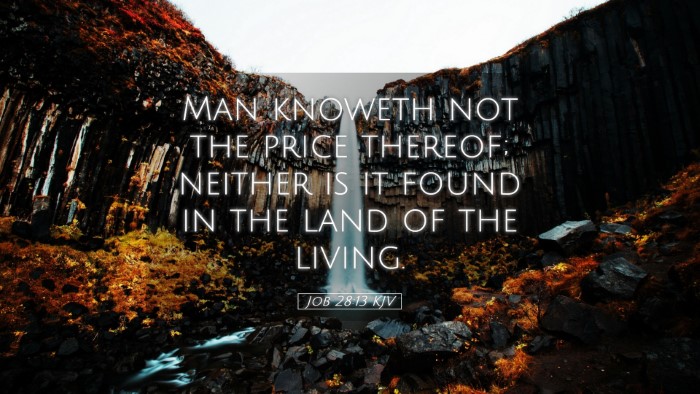Old Testament
Genesis Exodus Leviticus Numbers Deuteronomy Joshua Judges Ruth 1 Samuel 2 Samuel 1 Kings 2 Kings 1 Chronicles 2 Chronicles Ezra Nehemiah Esther Job Psalms Proverbs Ecclesiastes Song of Solomon Isaiah Jeremiah Lamentations Ezekiel Daniel Hosea Joel Amos Obadiah Jonah Micah Nahum Habakkuk Zephaniah Haggai Zechariah MalachiJob 28:13
Job 28:13 KJV
Man knoweth not the price thereof; neither is it found in the land of the living.
Job 28:13 Bible Commentary
Commentary on Job 28:13
Job 28:13 states: “Man does not know its value, nor is it found in the land of the living.” This verse is situated within Job’s discourse on wisdom, exploring its elusive nature and the limitations of human understanding. The following commentary synthesizes insights from various public domain sources.
Contextual Background
Setting of Job: The Book of Job addresses profound questions about suffering and divine justice. In this particular chapter, Job reflects on the nature of wisdom, contrasting it with the earthly pursuits of man and emphasizing its transcendence.
The Nature of Wisdom
As Job laments the inability of humanity to fully comprehend wisdom, he articulates a critical theological notion: wisdom is divine. Matthew Henry notes that wisdom is not merely an intellectual pursuit but a quality that entails a relationship with God and an understanding of His ways.
Albert Barnes highlights that wisdom is often sought by men through reason and experience, yet its true essence remains shrouded. Barnes asserts, "it is not found in the land of the living," suggesting that while human knowledge can provide insight, it pales in comparison to God’s wisdom.
Human Limitations
Adam Clarke elaborates on the idea that humanity, constrained by its earthly existence, lacks the capacity to grasp wisdom in its fullness. He states, “The search for wisdom leads to inevitable disappointment when pursued outside the divine realm.” Clarke emphasizes that the world’s treasures—material wealth, fame, and status—cannot purchase true wisdom.
- Illuminating the Limits: Clarke and Henry agree that mankind's understanding is fundamentally limited; wisdom surpasses human faculties.
- Defining True Value: The "value" of wisdom indicated in this verse requires a spiritual and moral consideration beyond materialistic views.
Divine Source of Wisdom
The commentators observe that while man may search for wisdom, it is ultimately found in God alone. Job presents a rhetorical contemplation illustrating that wisdom is not a commodity to be found or bought but is inherent in God’s character and creation.
Matthew Henry's Insight: Henry posits that wisdom's home is in heaven, reinforcing the idea that it is a divine attribute. He encourages readers to understand that seeking wisdom involves seeking God, underscoring Proverbs 2:5: "Then you will understand the fear of the Lord and find the knowledge of God."
Theological Implications
Job 28:13 prompts a consideration of the relationship between wisdom and revelation. The verse resonates with the New Testament understanding of Christ as the embodiment of wisdom. Barnes reflects on the Christian perspective, affirming that recognizing Jesus as the source of divine wisdom is paramount for believers.
Moreover, this commentary invokes an important pastoral application, urging leaders to guide congregations in searching for wisdom through prayer, scripture study, and fellowship instead of worldly means.
Conclusion
The insights from these esteemed commentaries on Job 28:13 reveal an interconnectedness between divine wisdom and the believer's journey. It highlights man's limitations and the necessity of divine revelation in understanding true wisdom.
In essence, wisdom is positioned as a significant theological theme in Job, beckoning all to recognize that its pursuit arises not from human endeavor but from a humble acknowledgment of God’s sovereignty and grace.


